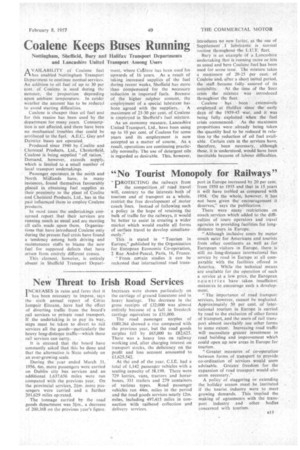Coalene Keeps Buses Running
Page 47

If you've noticed an error in this article please click here to report it so we can fix it.
Nottingham, Sheffield, Bury and Halifax Transport Departments and Lancashire United Transpart Among Users A V AlLABILITY of Coalene fuei t. has enabled Nottingham Transport Department to continue normal services. An addition to oil fuel of up to 30 per cent. of Coalene is used during the summer, the proportion depending upon ambient temperature. In colder weather the amount has to be reduced to avoid starting difficulties.
Coalene is cheaper than oil fuel and for this reason has been used by the department for many years. Consumption is not affected, and there have been no mechanical troubles that could be attributed to the fuel. A.E.C., Guy and Daimler. buses are operated.
Produced since 1940 by Coalite and Chemical Products, Ltd., Chesterfield,
Coalene is being supplied " off ration.
. .
Demand, however, exceeds supply, which is limited to a small number of local transport undertakings.
Passenger operators in the north and North Midlands have, in many instances, found themselves favourably placed in obtaining fuel supplies as their proximity to the plant Of Coalite and Chemical Products, Ltd., has in the past influenced them to employ Coalene products.
In most cases the undertakings concerned report that their services are running much as usual and are meeting all calls made upon them. Organizations that have introduced Coalenc only during the present fuel crisis have found a tendency among both driving and maintenance staffs to blame the new fuel for supposed defects that have arisen from entirely different causes.
This element, however, is entirely absent in Sheffield Transport Depart ment, where Colilene has been used for upwards of 16 years. As a result of taking increased supplies of the fuel during recent weeks, Sheffield has morethan compensated for the necessary reduction in imported' fuels. Because of the higher sulphur content, the employment of a special lubricant has been agreed with the suppliers. A maximum of 25-30 per cent. of Coalene is employed in Sheffield's fuel mixture.
As an economy measure, Lancashire United Transport, Ltd., have been using up to 10 per cent. of Coalene for some years and its employment is now accepted as a matter of course. As a result, operations are continuing practically normally: The use of detergent oils is regarded as desirable. This, however, introduces no new factor, as the use of SupMernent . I lubricants is normal routine throughout -the L.U.T. fleet.
Bury is an example of a Lancashire undertaking that is running more orless as usual and here Coalene fuel has been used for some time. The mixture takes a maximum of 20-25 per cent of Coalene and, after a short initial period, the staff became fully, assured of its
suitability. At the time of the Suex crisis the mixture was introduced throughout the fleet.
Coalene has been extensively employed at Halifax since the early days of the 1939-45 war, and it was being fully exploited when the fuel crisis commenced. As the maximum proportions were already being taken the quantity had to be reduced in relation to the reduction of oil fuel available. Certain cuts in the services have, therefore, been necessary, although these, it is understood, would have been inevitable because of labour difficulties.




































































































